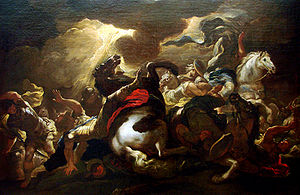One of the most stunning statements from the article is this:
Michael Tomasello, a developmental psychologist who co-directs the Max Planck Institute for Evolutionary Anthropology in Leipzig, Germany, has also done work related to morality and very young children. He and his colleagues have produced a wealth of research that demonstrates children's capacities for altruism. He argues that we are born altruists who then have to learn strategic self-interest.This is profound evidence, once again, of the truism (attributed to Abraham Maslow) that when all you have is a hammer, everything looks like a nail. Tomasello, and others of his ilk have begun their research with a premise. Their overarching metanarrative is that there is no God. Thus, every link in the chain of evidence reinforces that belief (or better, lack thereof), until at the end of the day their point of view is unassailable.
The notion that we are "born altruists who then have to learn strategic self-interest" could only have been proposed by someone who never had to get up for a 3 a.m. feeding. The altruistic infant would somehow understand, upon waking, that Mummy and Da need their sleep, that they will be certain, in the morning, to give the child as much food as he will need to survive, and that he should simply re-aquire his binky and return to blissful, altruistic slumber. Just where such an altruist would first learn "strategic self-interest" in the face of the doting nature of most new parents leaves me puzzled. The behavior of most parents, on the contrary, tends to reveal the better side of human nature—the denial of strategic self-interest. Of course, this evidence would not back up the 'non-God metanarrative', and so it must either be discounted or ignored.
After the page break the article makes the point that
[S]cientists have discovered neurological explanations for what many interpret as evidence of divine existence. Canadian psychologist Michael Persinger, who developed what he calls a "god helmet" that blocks sight and sound but stimulates the brain's temporal lobe, notes that many of his helmeted research subjects reported feeling the presence of "another." Depending on their personal and cultural history, they then interpreted the sensed presence as either a supernatural or religious figure. It is conceivable that St. Paul's dramatic conversion on the road to Damascus was, in reality, a seizure caused by temporal lobe epilepsy.
 What if science were to presuppose, rather than a [John] Lennonist notion of "no God, no religion", a God who, consistent with biblical evidence, created all things, declaring them "very good"(Genesis 1.31)? Might then one be able to see the sparking of the human brain under Persinger's "god helmet" as evidence that he was stimulating the very centers of the brain of the believer as are stimulated by the Holy Spirit? Could not the existence of these areas themselves be seen as evidence for God, rather than against Him? Rather than adaptive evolutionary triggers we have developed to insure that we all have a predisposition toward connectivity, may it not just possibly be, Drs. Persinger and Tomasello, that they are the product of "Intelligent Design"—that Whom we know as God, the Creator and Redeemer of the universe?
What if science were to presuppose, rather than a [John] Lennonist notion of "no God, no religion", a God who, consistent with biblical evidence, created all things, declaring them "very good"(Genesis 1.31)? Might then one be able to see the sparking of the human brain under Persinger's "god helmet" as evidence that he was stimulating the very centers of the brain of the believer as are stimulated by the Holy Spirit? Could not the existence of these areas themselves be seen as evidence for God, rather than against Him? Rather than adaptive evolutionary triggers we have developed to insure that we all have a predisposition toward connectivity, may it not just possibly be, Drs. Persinger and Tomasello, that they are the product of "Intelligent Design"—that Whom we know as God, the Creator and Redeemer of the universe? What if St. Paul's dramatic conversion on the road to Damascus was, in reality, his temporal humanity being seized by the God who redeemed him?
What if St. Paul's dramatic conversion on the road to Damascus was, in reality, his temporal humanity being seized by the God who redeemed him?Imagine that.

